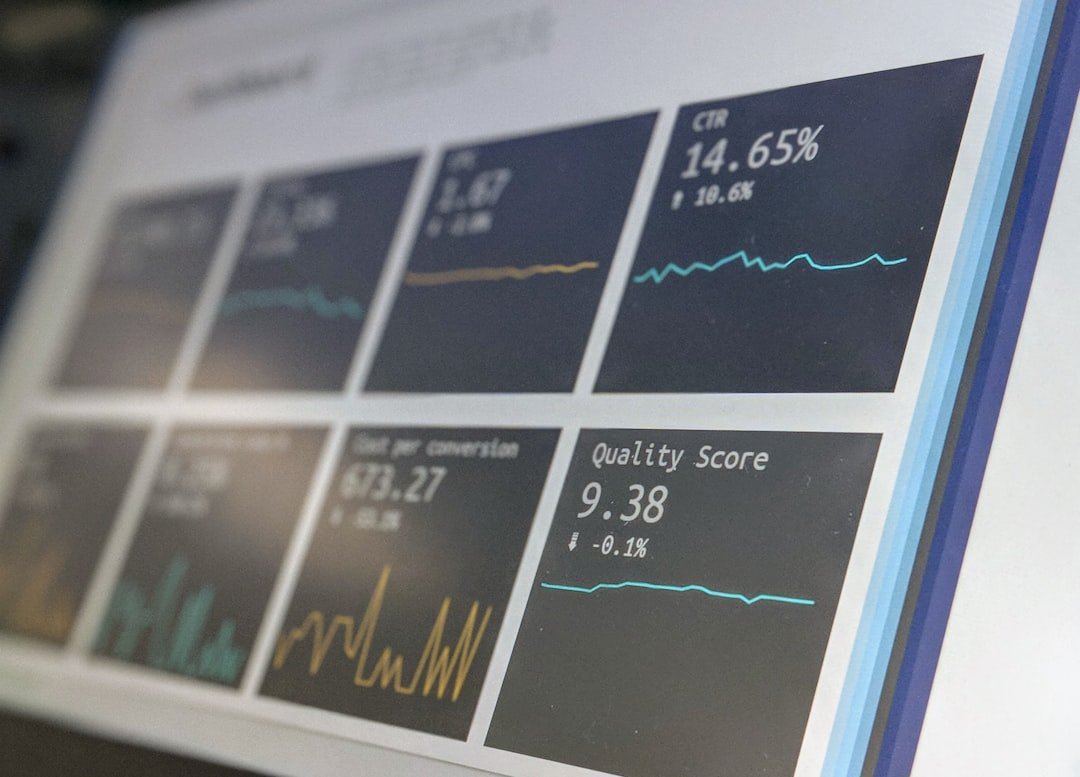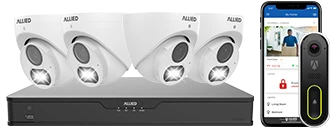Introduction to Business Security in DFW
The Dallas-Fort Worth (DFW) metropolitan area, with its robust economy and diverse industry presence, ranks as one of the fastest-growing regions in the United States. As businesses in DFW thrive, they also face various security challenges. Ensuring safety and protecting assets has become a paramount concern for business owners and operators across different sectors.
Business security encompasses a wide range of measures and strategies designed to protect businesses from threats such as burglary, vandalism, and other criminal activities. The primary aim is to safeguard physical assets, sensitive information, and personnel. With increasing instances of crime, particularly in urban areas, establishing effective security measures has become critical.
According to the Federal Bureau of Investigation (FBI), metropolitan areas like DFW experience significant rates of property crime, including theft and burglary. In response to these realities, business owners in DFW are increasingly turning to advanced security technologies to mitigate risks. One of the pivotal components of modern security infrastructures is the alarm system.
Alarm systems serve as a foundational element in business security frameworks. They provide real-time alerts and deterrents to potential intruders, thereby reducing the likelihood of criminal activities. Additionally, they play a crucial role in ensuring quick responses from law enforcement agencies and security personnel.
Key Functions of Business Security:
- Deterrence: The presence of security measures like alarm systems discourages potential criminals.
- Detection: Alarm systems detect unauthorized access and unusual activities, enabling prompt intervention.
- Response: Integrated alarm systems can automatically notify authorities, ensuring rapid response times.
- Recovery: Effective security measures aid in the recovery of assets and provide crucial evidence for investigations.
Alarm systems, as part of a comprehensive security solution, help address the unique challenges posed by the DFW business environment. As such, understanding their role and significance is vital for business owners looking to enhance their security protocols.
Overview of Alarm Systems: Types and Functions
Alarm systems are a crucial component of modern business security infrastructure, particularly in regions with bustling economic activity such as the Dallas-Fort Worth (DFW) area. These systems can be categorized into several types, each designed to address specific security needs and functions.
Intrusion Detection Systems are among the most common types of alarm systems used by businesses. These systems typically consist of sensors placed at entry points like doors and windows. When these sensors detect unauthorized entry, they trigger an alarm, notifying both the property owner and law enforcement agencies if the system is monitored.
Fire Alarm Systems play a vital role in protecting businesses from fire hazards. These systems utilize smoke detectors, heat sensors, and sprinkler systems to identify the presence of fire and alert occupants and emergency services. By providing an early warning, these alarms help to minimize property damage and save lives.
Carbon Monoxide Detectors are essential in environments where carbon monoxide poisoning is a risk. These detectors monitor for dangerous levels of CO gas, which is colorless and odorless, and alert building occupants to evacuate and seek fresh air.
Video Surveillance Systems work synergistically with other alarm systems by providing visual confirmation of security breaches. Modern systems often include high-definition cameras, night vision capabilities, and remote viewing options. These can be utilized not only for real-time monitoring but also for recording incidents for future analysis.
Access Control Systems are employed to restrict and monitor access to various parts of a business facility. Methods of access can include keycards, biometric scanners, and keypad entry systems. This type of system ensures that only authorized personnel can enter sensitive areas, thereby reducing the risk of internal theft and unauthorized access.
Each of these systems functions to provide a layer of security that addresses specific threats. When integrated, they create a comprehensive security solution that effectively safeguards businesses. The use of advanced technologies, such as IoT and AI, enhances the functionality of these systems, making them more accurate and reliable.
Businesses in the DFW area benefit from a wide range of options when it comes to selecting and implementing alarm systems. The key to maximizing their effectiveness lies in assessing specific security needs and choosing the right combination of systems to address those needs.
The Importance of Alarm Systems for Businesses in DFW
Alarm systems play a crucial role in ensuring the security of businesses in the Dallas-Fort Worth (DFW) area. The region, known for its significant economic activity, has a diverse range of businesses, all of which benefit immensely from robust security measures. The importance of alarm systems for these businesses cannot be overstated.
Firstly, alarm systems act as a strong deterrent to potential criminals. According to the National Institute of Justice, visible security measures such as alarm systems significantly reduce the likelihood of a crime being attempted. The mere presence of an alarm system can persuade would-be intruders to reconsider.
Furthermore, these systems provide immediate alerts in case of unauthorized access. The FBI’s Uniform Crime Reporting (UCR) Program indicates that the speed at which law enforcement can respond to a burglary is critical. Alarm systems ensure that authorities are notified promptly, increasing the chances of preventing or minimizing loss.
Alarm systems also offer comprehensive monitoring. Modern systems can be integrated with other security measures such as CCTV and access control systems to provide a layered security approach. According to a study by the Loss Prevention Research Council, businesses employing a multi-faceted security strategy experience fewer incidents of theft and vandalism.
In addition to physical security, alarm systems can be equipped to monitor environmental factors. For example, sensors can detect fires, gas leaks, or floods. Data from the National Fire Protection Association (NFPA) shows that early detection significantly improves response times and can prevent extensive damage.
Insurance companies recognize the value of alarm systems, often providing discounts or lower premiums for businesses that implement such security measures. According to the Insurance Information Institute (III), outfitting a business with a reliable alarm system can result in savings of up to 20% on insurance costs.
In summary, the importance of alarm systems for businesses in DFW lies in their ability to deter criminal activity, provide immediate alerts, facilitate comprehensive monitoring, and even reduce operational costs through insurance savings. Their role in enhancing the safety and security of commercial properties highlights their indispensability in the region’s business ecosystem.
Case Studies: Successful Implementation of Alarm Systems in DFW
In 2020, a Dallas-based technology firm experienced a significant reduction in theft and unauthorized access through the effective implementation of advanced alarm systems. The company incorporated a combination of motion sensors, access control systems, and surveillance cameras. An analysis of incident reports indicated a 40% decline in security breaches within the first year.
Similarly, another successful case involved a Fort Worth retail chain that installed a comprehensive alarm system integrating environmental sensors such as smoke and gas detectors. This implementation not only fortified their security measures but also ensured the safety of their premises from potential hazards like fire and gas leaks. Statistics from local law enforcement reported a decrease in emergency response calls by 30% after the alarm system was activated.
Furthermore, a logistics company in Arlington utilized a multi-tiered alarm system to secure their large warehouses. The integration of perimeter alarms, entry point sensors, and CCTV systems enabled real-time monitoring and rapid response to any security threat. Records from the company’s security team reveal a 25% reduction in property loss and damage, demonstrating the efficacy of their alarm system in safeguarding assets.
A small manufacturing business in Plano also deployed an advanced alarm system combining intrusion detection and video surveillance. The system’s real-time alert functionality provided immediate notifications to the security personnel, allowing them to address potential breaches promptly. As a result, company data shows a 50% drop in unauthorized entries and inventory loss over an 18-month period.
Finally, a medical facility in Irving successfully implemented an alarm system focusing on protecting sensitive patient data and controlled substances. The system’s access control technology regulated entry to restricted areas while logging all access attempts for audit purposes. This has contributed to a 35% increase in security compliance, as reported in the facility’s annual audit reports.
Comparative Analysis of Popular Alarm System Providers in DFW
The Dallas-Fort Worth (DFW) area hosts a plethora of businesses, ranging from small enterprises to large corporations, each requiring effective security measures. A comparative analysis of popular alarm system providers in DFW reveals distinct features, pricing structures, and service offerings that cater to diverse business needs.
ADT remains one of the leading alarm system providers in DFW. They offer comprehensive solutions that include intrusion detection, video surveillance, and access control. ADT’s services are noted for their 24/7 monitoring capability and rapid response times, which are critical for mitigating potential risks.
Vivint is another prominent provider, known for integrating smart technology into their security systems. Businesses opting for Vivint benefit from advanced automation features, such as remote control via mobile apps and customizable alerts. This integration allows for both traditional security and enhanced operational efficiency.
Brinks Home Security offers robust security solutions tailored to businesses. Their systems include unique features such as cloud-based video storage and energy management integration, providing both security and energy-saving benefits. Brinks is also noted for its competitive pricing and professional installation services.
The following table provides a comparative overview of these providers based on some key criteria:
| Provider | Key Features |
|---|---|
| ADT | 24/7 monitoring, rapid response, comprehensive solutions |
| Vivint | Smart technology integration, remote control via mobile apps, customizable alerts |
| Brinks Home Security | Cloud-based video storage, energy management integration, competitive pricing |
When assessing alarm systems, it’s crucial for businesses to consider the total cost of ownership (TCO), which includes not only the initial installation costs but also ongoing monitoring fees and potential maintenance expenses. ADT, for instance, offers flexible financing plans, while Vivint may require a higher up-front investment due to its advanced technology. Brinks often appeals to budget-conscious businesses due to its competitive pricing structure.
An important factor in choosing an alarm system provider is the customer service reliability. ADT is highly rated for its extensive customer support infrastructure. Vivint prioritizes customer experience through its high-tech interface, but may have limited service locations. On the other hand, Brinks is known for its localized customer service, which is beneficial for businesses in DFW looking for prompt, on-site support.
Ultimately, the choice of an alarm system provider in the DFW area depends on a business’s specific security needs, budget constraints, and preference for technological features. Comprehensive research and direct consultation with providers can help businesses make informed decisions, ensuring optimal security investment and protection.
Technological Advancements in Alarm Systems
Technological advancements have significantly transformed alarm systems, enhancing their efficacy, reliability, and user-friendliness. Businesses in the Dallas-Fort Worth (DFW) area can greatly benefit from understanding and implementing these innovations.
Integration with IoT
The Internet of Things (IoT) has paved the way for more interconnected and intelligent alarm systems. IoT allows alarm systems to integrate with other smart devices, providing businesses with a cohesive security network. For example, IoT-enabled alarm systems can communicate with surveillance cameras, access control systems, and emergency response devices, ensuring a faster and more coordinated response to security breaches.
AI and Machine Learning
Artificial Intelligence (AI) and machine learning technologies have revolutionized alarm systems. These advancements enable alarm systems to analyze patterns, predict potential security threats, and reduce the occurrence of false alarms. AI-driven systems can differentiate between normal and suspicious activity, providing businesses with more accurate and actionable alerts.
Cloud-Based Solutions
Cloud computing offers several advantages for alarm systems. Cloud-based alarm systems provide real-time monitoring and notifications, enabling businesses to keep track of their security status from anywhere with an internet connection. Additionally, cloud solutions offer scalable storage options and automatic updates, reducing the need for costly on-site infrastructure and maintenance.
| Technology | Benefits |
|---|---|
| IoT Integration | Enhanced connectivity and coordination between devices |
| AI and Machine Learning | More accurate threat detection and reduced false alarms |
| Cloud-Based Solutions | Real-time monitoring, scalability, and reduced maintenance costs |
Mobile Access and Control
Mobile technology has become an integral part of modern alarm systems. Many contemporary systems offer mobile apps that allow business owners to monitor and control their security systems remotely. Features often include real-time alerts, live video feeds, and the ability to arm or disarm the system from a smartphone or tablet.
Advanced Sensors
Technological advancements have also led to the development of more sophisticated sensors. Modern alarm systems utilize a variety of advanced sensors, including motion detectors, glass-break sensors, and environmental sensors (such as smoke and carbon monoxide detectors). These sensors provide comprehensive coverage and enhance the overall security of business premises.
In conclusion, technological advancements in alarm systems offer significant benefits for businesses in DFW. By leveraging modern innovations such as IoT integration, AI, cloud computing, mobile access, and advanced sensors, businesses can enhance their security measures, ensuring a safer and more secure environment for their operations.
Challenges and Solutions in Implementing Alarm Systems
When businesses in the Dallas-Fort Worth (DFW) area decide to implement alarm systems, they often face a variety of challenges that can affect the efficacy and reliability of their security measures. However, identifying these challenges and exploring viable solutions can significantly enhance the overall security posture of these businesses.
One common challenge is the integration of the alarm system with existing security infrastructure. Many businesses already have some form of security measures in place, such as CCTV cameras or access control systems. Ensuring that the new alarm system communicates effectively with these components can be complex and may require specialized technical expertise.
Another prevalent issue is the cost associated with installing and maintaining advanced alarm systems. Small and medium-sized enterprises (SMEs) in particular may find it financially burdensome to invest in high-quality systems. To address this, several providers offer flexible financing options or scalable systems that allow businesses to start with a basic setup and expand it as their budget allows.
False alarms represent a significant challenge as well. Frequent false alarms can lead to complacency and may reduce the perceived reliability of the system. To mitigate this risk, modern alarm systems incorporate advance
d sensor technologies and machine learning algorithms to better distinguish between actual threats and non-threatening events.
Employee training is another critical component that can pose a challenge. For an alarm system to be effective, employees need to understand how to use it correctly. Regular training programs and drills can ensure that staff are proficient in operating the system and responding appropriately in the event of an alarm.
The following table summarizes some common challenges and their potential solutions:
| Challenge | Solution |
|---|---|
| Integration with Existing Systems | Engage technical experts for seamless integration |
| High Installation and Maintenance Costs | Explore financing options or scalable system setups |
| False Alarms | Implement advanced sensor technologies and algorithms |
| Employee Training | Conduct regular training programs and drills |
Businesses in DFW must also navigate compliance with local regulations and industry standards when installing alarm systems. Staying updated with these regulations ensures that the business is not only secure but also legally compliant. Local authorities and industry bodies may offer guidelines and resources to facilitate this process.
In summary, while implementing alarm systems in businesses within the DFW area comes with its set of challenges, understanding these obstacles and leveraging appropriate solutions can significantly improve the safety and security of the business environment. Continuous advancements in technology and better financing models are likely to further ease these implementation challenges, making alarm systems an indispensable component of business security in DFW.
Future Trends in Business Security and Alarm Systems in DFW
As technology evolves, the future trends in business security and alarm systems in the DFW (Dallas-Fort Worth) area are set to transform the landscape significantly. Emerging technologies and innovative approaches to security are poised to enhance the effectiveness and adaptability of alarm systems, addressing the rapidly changing security needs of businesses.
Integration with Smart Technologies
One of the key future trends is the integration of alarm systems with smart technologies. The advent of the Internet of Things (IoT) has enabled devices to communicate with each other, leading to more coherent and comprehensive security solutions. Businesses can expect alarm systems that seamlessly integrate with other smart devices such as cameras, access control systems, and environmental sensors. This interconnected approach allows for real-time monitoring and instant responses to potential threats.
Artificial Intelligence and Machine Learning
Artificial intelligence (AI) and machine learning (ML) are playing increasingly significant roles in enhancing alarm systems. AI-driven alarm systems can analyze vast amounts of data to identify patterns and predict security breaches before they occur. Machine learning algorithms can improve over time, continuously refining their ability to detect unusual activities. This proactive approach results in faster and more accurate threat detection, reducing false alarms and improving overall security.
Cloud-Based Systems
Cloud-based security solutions are gaining popularity due to their scalability, flexibility, and ease of access. With cloud technology, businesses can store and analyze security data remotely, allowing for more efficient and centralized management of alarm systems. The use of cloud platforms also facilitates regular updates and maintenance, ensuring that security measures remain up-to-date with the latest advancements.
Enhanced Cybersecurity Measures
As alarm systems become more connected, the importance of cybersecurity cannot be overstated. Future alarm systems will incorporate advanced encryption methods and secure communication protocols to protect against cyber threats. Businesses will need to prioritize cybersecurity to safeguard their alarm systems from potential hacking and unauthorized access.
Mobility and Remote Access
The ability to control and monitor alarm systems remotely via mobile devices is another emerging trend. Mobile applications enable business owners and security personnel to receive instant notifications, view live feeds, and control security systems from anywhere. This mobility enhances the responsiveness and flexibility of business security operations.
Sustainability and Energy Efficiency
Sustainable practices are becoming increasingly important in all aspects of business, including security. Future alarm systems will likely focus on energy-efficient technologies and environmentally friendly practices. For example, alarm systems powered by solar panels or those designed to consume less energy during operation will contribute to a business’s sustainability goals.
In conclusion, the future of business security and alarm systems in DFW is characterized by greater integration, intelligence, and connectivity. By adopting these advancements, businesses can greatly enhance their security posture, ensuring the safety of their assets and personnel in an increasingly complex threat landscape.













